2013版初中英语全程复习方略课件(教材复习案)七年级上册 Units 1-6(人教版) (共60张PPT)
文档属性
| 名称 | 2013版初中英语全程复习方略课件(教材复习案)七年级上册 Units 1-6(人教版) (共60张PPT) | 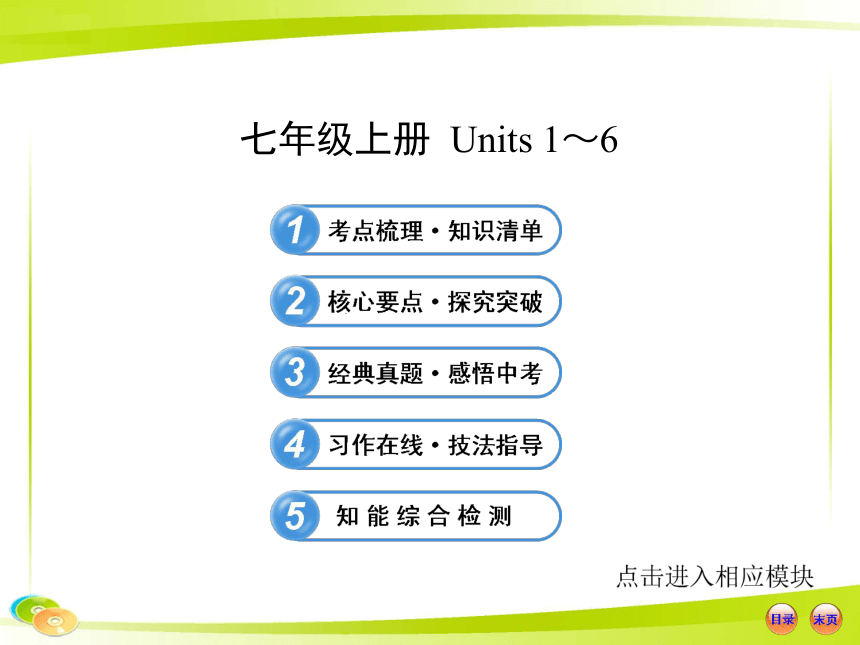 | |
| 格式 | zip | ||
| 文件大小 | 2.2MB | ||
| 资源类型 | 教案 | ||
| 版本资源 | 外研版 | ||
| 科目 | 英语 | ||
| 更新时间 | 2014-03-06 21:30:21 | ||
图片预览

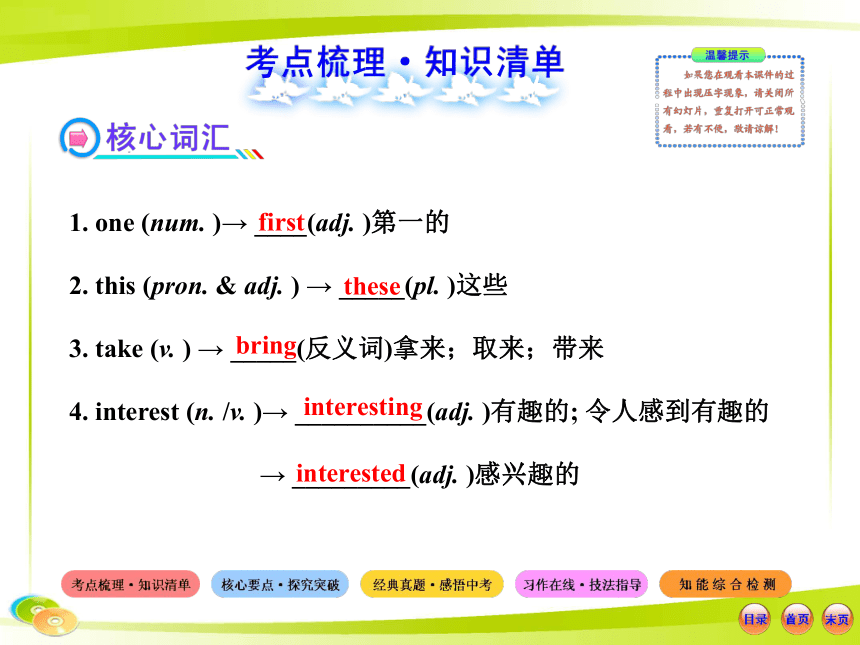
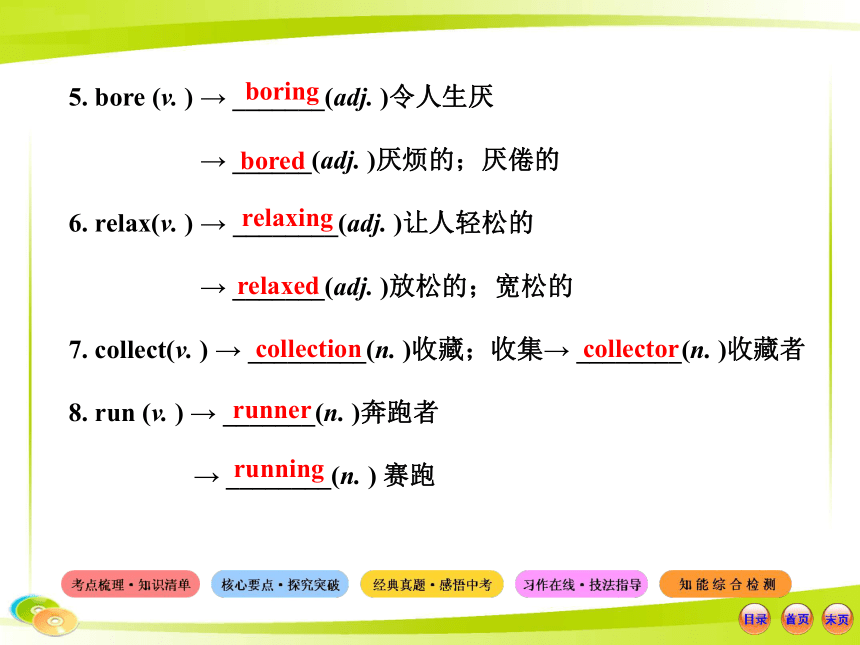
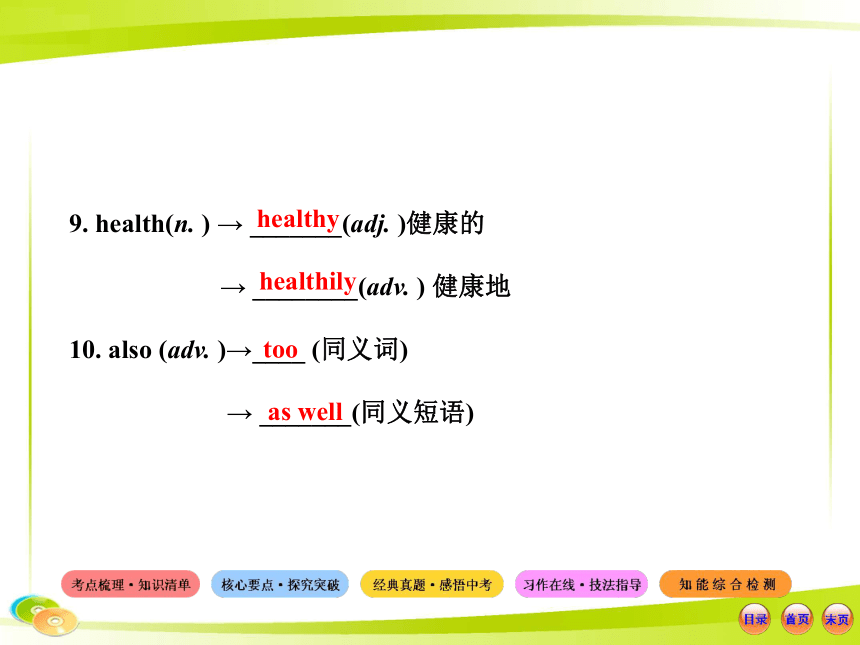
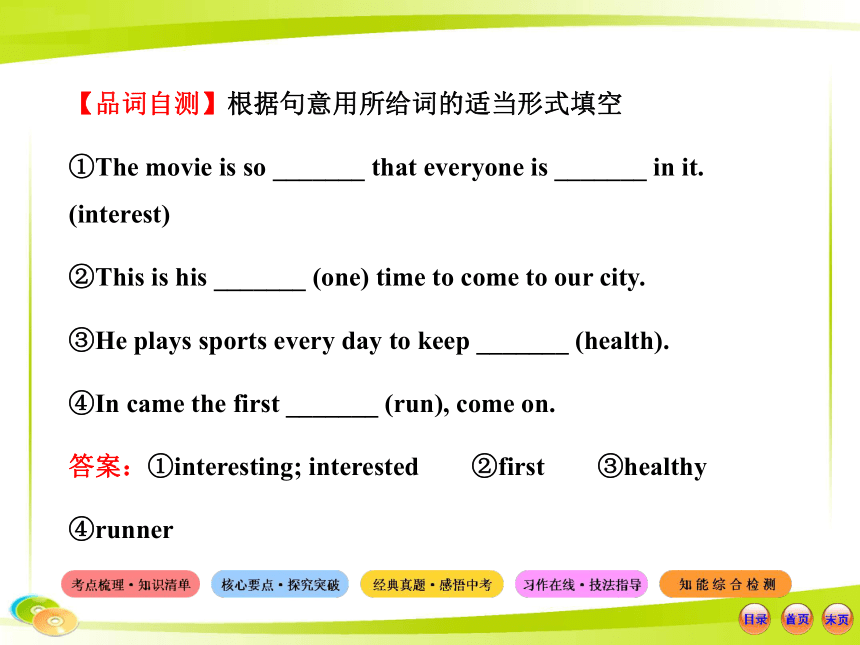
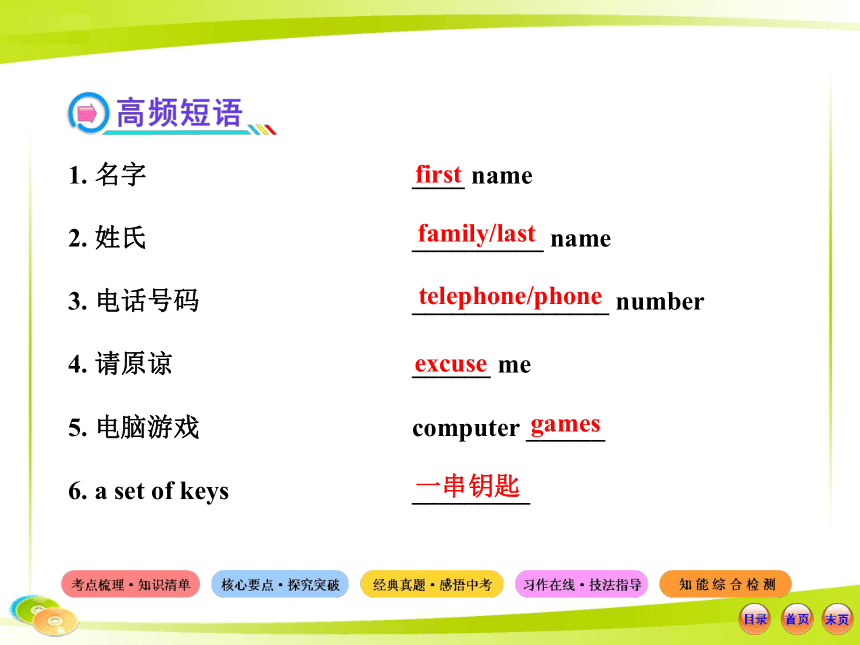
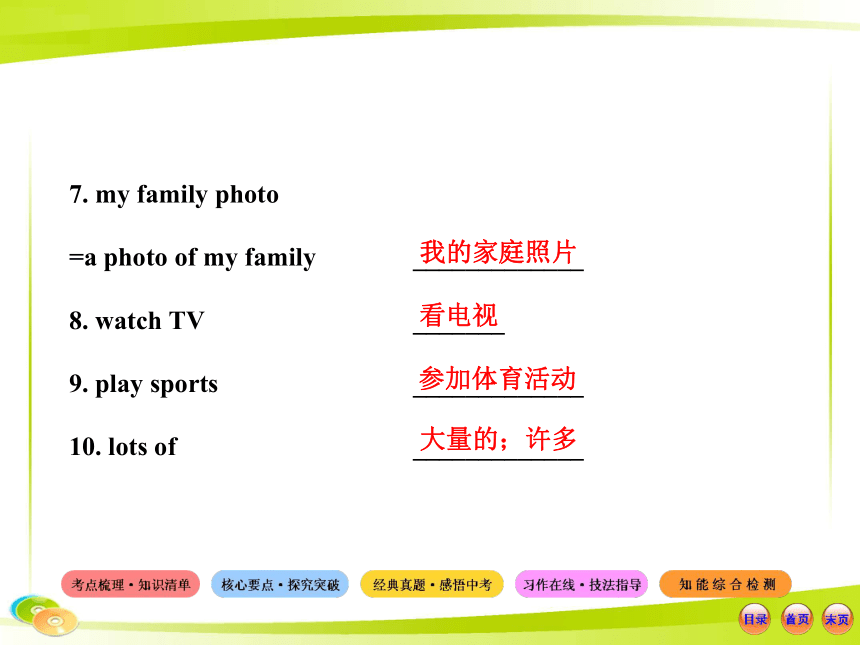
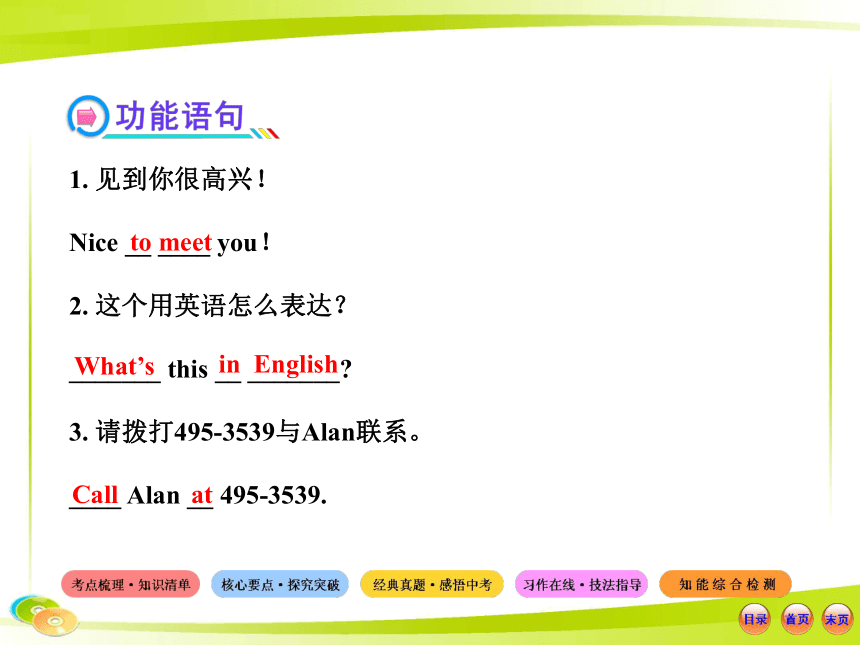
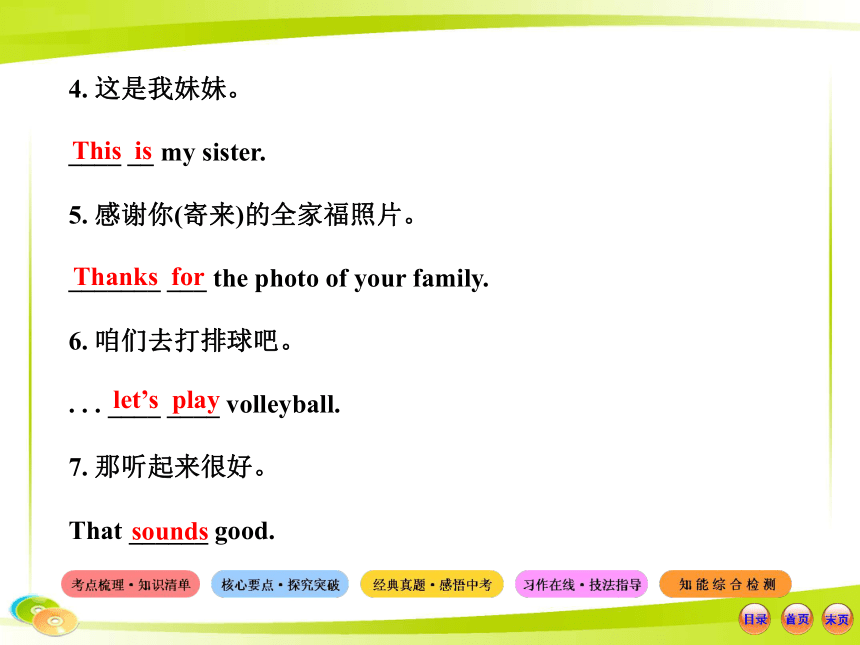
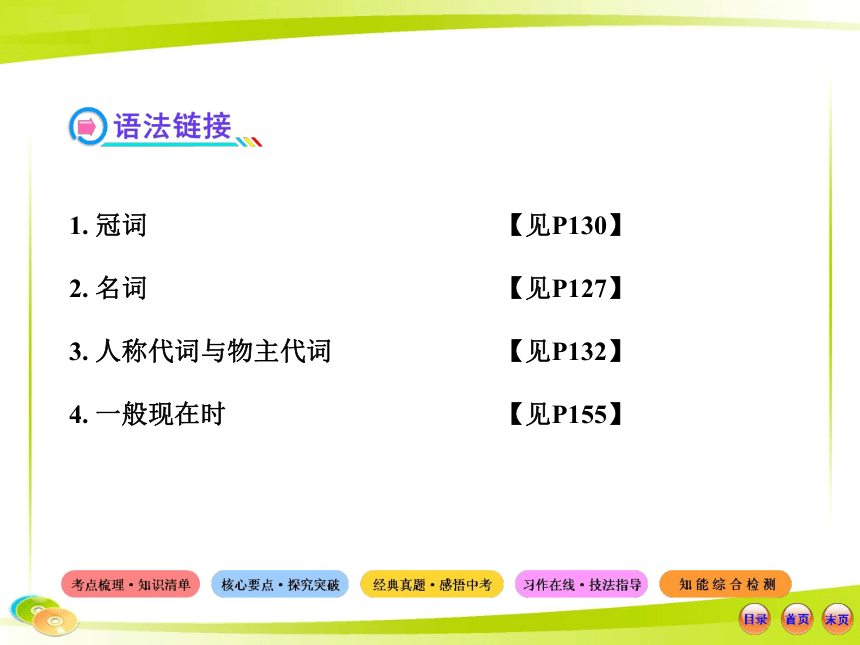
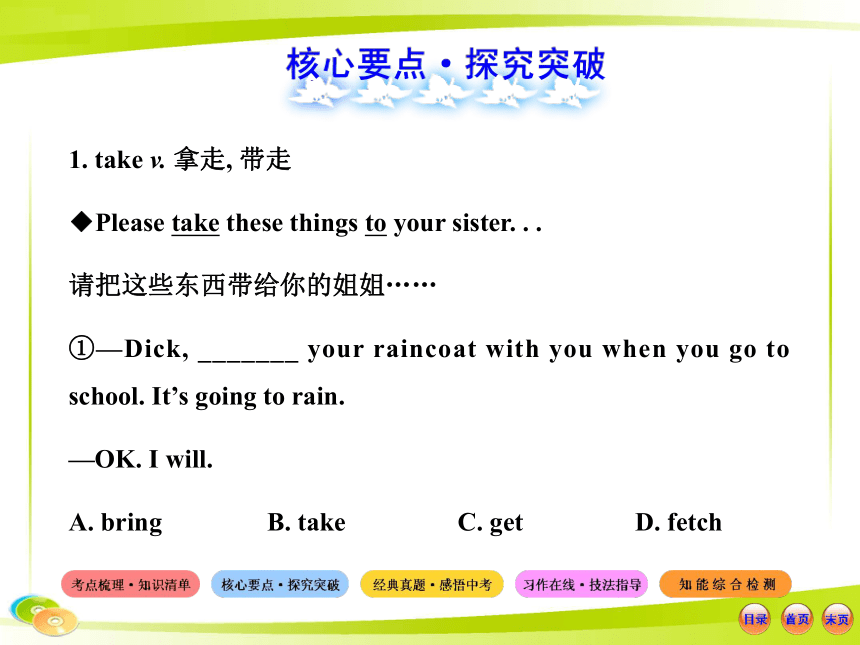
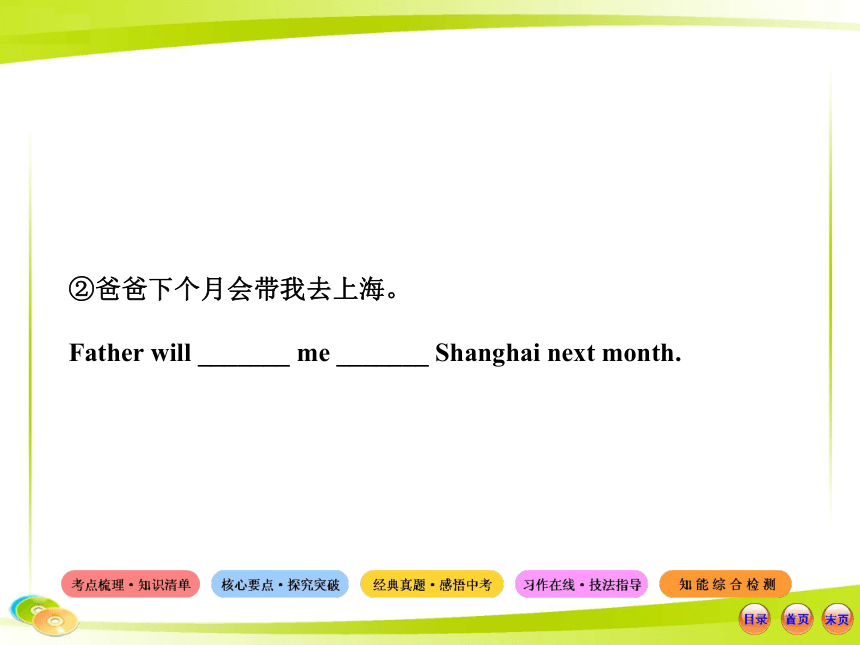
文档简介
(共60张PPT)
七年级上册 Units 1~6
1. one (num. )→ ____(adj. )第一的
2. this (pron. & adj. ) → _____(pl. )这些
3. take (v. ) → _____(反义词)拿来;取来;带来
4. interest (n. /v. )→ __________(adj. )有趣的; 令人感到有趣的
→ _________(adj. )感兴趣的
first
these
bring
interesting
interested
5. bore (v. ) → _______(adj. )令人生厌
→ ______(adj. )厌烦的;厌倦的
6. relax(v. ) → ________(adj. )让人轻松的
→ _______(adj. )放松的;宽松的
7. collect(v. ) → _________(n. )收藏;收集→ ________(n. )收藏者
8. run (v. ) → _______(n. )奔跑者
→ ________(n. ) 赛跑
boring
bored
relaxing
relaxed
collection
collector
runner
running
9. health(n. ) → _______(adj. )健康的
→ ________(adv. ) 健康地
10. also (adv. )→____ (同义词)
→ _______(同义短语)
healthy
healthily
too
as well
【品词自测】根据句意用所给词的适当形式填空
①The movie is so _______ that everyone is _______ in it. (interest)
②This is his _______ (one) time to come to our city.
③He plays sports every day to keep _______ (health).
④In came the first _______ (run), come on.
答案:①interesting; interested ②first ③healthy
④runner
1. 名字 ____ name
2. 姓氏 __________ name
3. 电话号码 _______________ number
4. 请原谅 ______ me
5. 电脑游戏 computer ______
6. a set of keys _________
first
family/last
telephone/phone
excuse
games
一串钥匙
7. my family photo
=a photo of my family _____________
8. watch TV _______
9. play sports _____________
10. lots of _____________
我的家庭照片
看电视
参加体育活动
大量的;许多
1. 见到你很高兴!
Nice __ ____ you!
2. 这个用英语怎么表达?
_______ this __ _______
3. 请拨打495-3539与Alan联系。
____ Alan __ 495-3539.
to meet
What’s
in English
Call
at
4. 这是我妹妹。
____ __ my sister.
5. 感谢你(寄来)的全家福照片。
_______ ___ the photo of your family.
6. 咱们去打排球吧。
. . . ____ ____ volleyball.
7. 那听起来很好。
That ______ good.
This is
Thanks for
let’s play
sounds
1. 冠词 【见P130】
2. 名词 【见P127】
3. 人称代词与物主代词 【见P132】
4. 一般现在时 【见P155】
1. take v. 拿走, 带走
◆Please take these things to your sister. . .
请把这些东西带给你的姐姐……
①—Dick, _______ your raincoat with you when you go to school. It’s going to rain.
—OK. I will.
A. bring B. take C. get D. fetch
②爸爸下个月会带我去上海。
Father will _______ me _______ Shanghai next month.
【自主归纳】
答案:①B ②take; to
take
bring
____(. . . to. . . )
拿去;带去
把某物(人)从说话处带
到别处,与bring方向
相反
_____(. . . to. . . )
拿来;带来
把某物(人)从别处带到
说话处
carry搬运;提;拿
不强调方向,但有负重
之意
get拿来;取来
(=fetch)
去别处把某物(人)带
来,强调动作的往返
2. family n. 家,家庭
◆What’s your family name 你姓什么?
①—How many people are there in your _______
—There’re three, my parents and I.
A. family B. home C. house D. homes
②The Green family _______ watching TV now.
A. is B. are C. was D. were
【自主归纳】
home
家;家乡;
本国
指家庭成员在一起生活的地方
house
房子
主要指建筑物、住宅,可以包
含若干房间(rooms)
family
家庭
指“一个家庭”时,视为一个整
体,用作单数名词,谓语动词
用单数
家庭成员
指“家庭成员”时视为复数名
词,谓语动词用复数
答案:①A ②B
home家 house房子 family家庭
3. need v. 需要
◆I need my hat, my notebook and a pen.
我需要我的帽子、笔记本和钢笔。
①Sam looks very tired, he needs _______ a good rest.
A. have B. to have C. having D. has
②我不必买新裤子,这条旧的只需要洗洗就行。
I _______ buy new pants, the old pair just needs _______.
③—Must we leave Libya(利比亚)now
—No, we _______. I think the people here are _______ help.
A. needn’t; in need of B. mustn’t; needing
C. needn’t; needing D. mustn’t; in need of
【自主归纳】need的用法总结
(1)作实义动词
①need+n. / pron. 需要某人/某物
②need+ _____(do / to do)sth. 需要做某事
③sb. /sth. need(s)+doing
=sb. /sth. need(s)+to be done
某人/某事需要被……
to do
(2)作情态动词(否定或疑问形式)
①可用于否定或用于引导一般疑问句
②—Must. . . 句式否定答语用needn’t或don’t have to
(3)作不可数名词,常用短语in need of意为“需要”
答案:①B ②needn’t; washing ③A
4. interesting adj. 有趣的
◆That sounds interesting.
那听起来很有趣。
①He told us an _______ story and we’re all _______ in it.
A. interested; interesting
B. interesting; interested
C. interesting; interesting
D. interested; interested
②Many young people take great _______ in chatting online.
A. interest B. interests
C. interested D. interesting
【自主归纳】interesting/interested/interest的用法辨析
_________ adj. 令人
感兴趣的 多用于修饰物,既可作表语,也可作定语 be/get/
become interested in=take
(an)
interest in. . .
对……感兴趣
_________ adj. 感
兴趣的 用来修饰人,只作表语
interest n. 兴趣,
爱好 作“兴趣”时,是不可数名词;作“爱好”时是可数名词
v. 使……
感兴趣 interest sb. 使某人感兴趣
interesting
interested
答案:①B ②A
5. watch v. 观看
◆But he doesn’t play sports—he only watches them on TV.
但他不做运动,他只是在电视上观看。
①Mary likes _______ books while her brother likes _______ sports games on TV.
A. watching; looking
B. reading; seeing
C. looking; watching
D. reading; watching
②My parents often watch me _______(play) basketball when I’m in a match.
【自主归纳】
(1)______指“(聚精会神
地)看;注视”,如看电
视、比赛等
(2)look强调“看”的动
作,作不及物动词
看电视______ TV
看黑板look at the blackboard
watch
watch
(3) ___强调“看”的结
果,如看电影、看病等
(4)read指“阅读”,如看
书、报刊、杂志等
看电影___ a film
看报纸 read the newspaper
see
see
【温馨提示】“看人做事”有区别
①watch sb. do sth. 观看(注视)某人做某事
do sth. 看见某人做了某事(过程)
doing sth. 看见某人正在做某事(状态)
答案:①D ②play
②see sb.
6. lots of许多,大量的
◆Running star Sandra Clark eats lots of healthy food.
跑步明星桑德拉·克拉克吃许多健康食品。
①We need _______ food every day.
A. a lot B. many C. a lot of D. lots
②You have given me _______ help. Thanks _______.
A. a lot; a lot of B. a lot of;a lot
C. lots of;lot D. many;lots of
【自主归纳】a lot of/a lot的用法辨析
a lot of =lots of/plenty of,后接可数名词复数(=many)或不可数名词(=much)
a lot 用于动词后作状语;形容词或副词的_______前表
示“……得多”
比较级
答案:①C ②B
7. Well,let’s play volleyball. 喂, 咱们去打排球吧。
①Let’s _______(take) a walk after supper.
②Let’s have a party next week, _______
A. shall we B. will you
C. don’t you D. are we
③Shall we go to the movies on Sunday evening (改为同义句)
_______ _______ to the movies on Sunday evening.
【自主归纳】
(1)辨析let’s/let us
Let’s do sth. 表示提建议,意为“咱们做某事吧”。一般肯定回答用OK. /All right. ;否定回答用Sorry, but I. . . ;反意疑问句用shall we
Let us do sth. 表示请求他人允许,意为“请让(允许)我们
做某事吧”,反意疑问句一般用________
will you
(2)有关提建议的句型
答案:①take ②A ③Let’s go
doing
do
do
doing
8. That sounds good. 那听起来很好。
①—Let’s draw a picture of the sun.
—That sounds _______ to me.
A. easy B. easily
C. difficultly D. interested
②The English song _______ very nice. Can you guess who is singing
A. smells B. tastes C. sounds D. looks
③How nice her _______ sounds!
A. sound B. voice C. noise D. saying
【自主归纳】
(1)sound是感官动词,意为“听起来”,后接形容词作表语;sound like后接名词或代词,意为“听起来像……”;
(2)感官动词是系动词的一种,表示人的感觉,后接形容词作表语。常见的感官动词有:
feel(感觉);look(看起来);sound(听起来);smell(闻起来);taste(尝起来);
(3)读图辨析sound/noise/voice的用法
______
_____
_____
sound
自然界各种声音的总称
noise
专指噪音或不悦耳的声音
voice
说话声或嗓音
【判断抢答】判断下面句子翻译正误
这首歌听起来很伤感。
①The song sounds sad. ( )
②The song is sounded sad. ( )
答案:①A ②C ③B
√
×
Ⅰ. 单项选择
1. (2012·重庆中考)—Bill, what’s your sister’s favorite _______
—She likes volleyball best.
A. food B. color C. sport D. movie
【解析】选C。考查名词的用法。food食物; color颜色;sport运动;movie电影。由下文“她最喜欢排球”,得知上文应该问“你姐姐最喜欢的运动是什么?”,选C。
2. (2012·福州中考)There is no living thing on _______ moon.
A. the B. a C. 不填
【解析】选A。考查冠词的用法。在世界上独一无二的事物前需要加定冠词the, 如the sun, the Earth等。此处句意为:月球上没有生命。故选A。
3. (2012·宁波中考)—Is this your notebook
—No, it isn’t. Ask Bill. He is looking for _______.
A. mine B. yours C. hers D. his
【解析】选D。考查物主代词的辨析。mine我的;yours你的;hers她的;his他的。根据上句“这是你的笔记本吗?”可知,下句意思应该是“不是,问问比尔,他正在找他的。”,故选D。
4. (2012·菏泽中考)—What do you call your father’s sisters
—_______.
A. Uncles B. Cousins C. Aunts D. Parents
【解析】选C。考查名词的用法。由问句“你称呼你爸爸的姐妹什么?”可知答语应为“称呼姑妈”。aunt意为“阿姨;姑妈;伯母;舅妈”。故选C。
【归纳总结】
物主代词分为形容词性物主代词和名词性物主代词。形容词性物主代词后要接名词,名词性物主代词后不接名词。
5. (2012·安顺中考)Would you please lend me _______ English book _______ isn’t here.
A. your; I B. you; My
C. yours; Mine D. your; Mine
【解析】选D。第一空后有名词English book, 故用形容词性物主代词;第二空后没有名词,故用名词性物主代词。句意:请把你的英语书借我用一下可以吗?我的不在这儿。
Ⅱ. 句型转换
1. (2012·兰州中考)The knife in the box is Tony’s. (改为复数形式)
The _______ in the boxes _______ Tony’s.
2. (2012·安顺中考)I think that he is coming tomorrow. (改为否定句)
I _______ think that he _______ coming tomorrow.
答案: 1. knives; are 2. don’t; is
3. (2012·济南中考)The tourists are on the beach. (改为否定句)
The tourists _______ _______ on the beach.
4. (2011·百色中考)The nurse does all the housework in my home every day. (改为一般疑问句)
_______ the nurse _______ all the housework in your home every day
答案: 3. are not 4. Does; do
对人物的介绍在每年的中考写作中都占有一定比例。如果是介绍单个人物,应注意先外后内、先分后总的写作技巧,即先从外观相貌等基本方面入手,过渡到对个性等内在品质的展露;如果是对同层面的人物加以群体介绍,可以考虑先对比后总结的形式,即先整体说明群体的优缺点,然后做出总结评价。
【典题示例】
(2012·陕西中考)
同学们,我们身边有很多助人为乐的同学,他们的事例值得我们学习。请根据下面表格信息给学校英文报写一篇短文,谈谈身边的好人好事,号召大家向他们学习。
Who they are What they usually do to help others
Lin Na make our school beautiful(clean. . . )
Zhang Hua help other students with their studies. . .
Wu Tong help the people in trouble(cheer others up. . . )
… …
要求:1. 参考表格信息,可适当发挥;
2. 语句通顺,意思连贯,书写工整;
3. 文中不得出现真实地名、校名和姓名;
4. 词数:60~80词。(开头和结尾已给出,但不计入
总词数。)
Dear Editor,
In our school, some students are always thinking more of
others and are ready to help them. I am moved deeply. Here is
what they usually do.
Lin Na is a very good student. ________________________
______________________________________________________
______________________________________________________
I hope everyone can learn from them and do something for
others.
【审题谋篇】
1. 总体定位:本文为投稿短文,说明身边事例,应为记叙文,其中会涉及到部分实例证明;
2. 人称:第三人称;
3. 主要时态:以一般现在时为主。
4. 高分模板:
【佳作诵读】
Dear Editor,
In our school, some students are always thinking more of others and are ready to help them. I am moved deeply. Here is what they usually do.
Lin Na is a very good student. She often picks up rubbish and cleans the classroom to make our school more beautiful. Zhang Hua studies well. So she often helps other students with their studies. We all like her. Wu Tong is outgoing. He likes cheering
others up. If we are sad, he always talks with us and tries to make us happy. He is also helpful. He likes helping people who are in trouble. He is very popular in our school.
I hope everyone can learn from them and do something for others.
【名师点睛】
(1)开篇点题,引出身边事例,其中“Here is. . . ”句式常作为引出下文的经典句型,我们可以学习使用;
(2)文中通过使用比较级、被动语态、定语从句等不同形式,显示出作者较强的语言驾驭能力。
七年级上册 Units 1~6
1. one (num. )→ ____(adj. )第一的
2. this (pron. & adj. ) → _____(pl. )这些
3. take (v. ) → _____(反义词)拿来;取来;带来
4. interest (n. /v. )→ __________(adj. )有趣的; 令人感到有趣的
→ _________(adj. )感兴趣的
first
these
bring
interesting
interested
5. bore (v. ) → _______(adj. )令人生厌
→ ______(adj. )厌烦的;厌倦的
6. relax(v. ) → ________(adj. )让人轻松的
→ _______(adj. )放松的;宽松的
7. collect(v. ) → _________(n. )收藏;收集→ ________(n. )收藏者
8. run (v. ) → _______(n. )奔跑者
→ ________(n. ) 赛跑
boring
bored
relaxing
relaxed
collection
collector
runner
running
9. health(n. ) → _______(adj. )健康的
→ ________(adv. ) 健康地
10. also (adv. )→____ (同义词)
→ _______(同义短语)
healthy
healthily
too
as well
【品词自测】根据句意用所给词的适当形式填空
①The movie is so _______ that everyone is _______ in it. (interest)
②This is his _______ (one) time to come to our city.
③He plays sports every day to keep _______ (health).
④In came the first _______ (run), come on.
答案:①interesting; interested ②first ③healthy
④runner
1. 名字 ____ name
2. 姓氏 __________ name
3. 电话号码 _______________ number
4. 请原谅 ______ me
5. 电脑游戏 computer ______
6. a set of keys _________
first
family/last
telephone/phone
excuse
games
一串钥匙
7. my family photo
=a photo of my family _____________
8. watch TV _______
9. play sports _____________
10. lots of _____________
我的家庭照片
看电视
参加体育活动
大量的;许多
1. 见到你很高兴!
Nice __ ____ you!
2. 这个用英语怎么表达?
_______ this __ _______
3. 请拨打495-3539与Alan联系。
____ Alan __ 495-3539.
to meet
What’s
in English
Call
at
4. 这是我妹妹。
____ __ my sister.
5. 感谢你(寄来)的全家福照片。
_______ ___ the photo of your family.
6. 咱们去打排球吧。
. . . ____ ____ volleyball.
7. 那听起来很好。
That ______ good.
This is
Thanks for
let’s play
sounds
1. 冠词 【见P130】
2. 名词 【见P127】
3. 人称代词与物主代词 【见P132】
4. 一般现在时 【见P155】
1. take v. 拿走, 带走
◆Please take these things to your sister. . .
请把这些东西带给你的姐姐……
①—Dick, _______ your raincoat with you when you go to school. It’s going to rain.
—OK. I will.
A. bring B. take C. get D. fetch
②爸爸下个月会带我去上海。
Father will _______ me _______ Shanghai next month.
【自主归纳】
答案:①B ②take; to
take
bring
____(. . . to. . . )
拿去;带去
把某物(人)从说话处带
到别处,与bring方向
相反
_____(. . . to. . . )
拿来;带来
把某物(人)从别处带到
说话处
carry搬运;提;拿
不强调方向,但有负重
之意
get拿来;取来
(=fetch)
去别处把某物(人)带
来,强调动作的往返
2. family n. 家,家庭
◆What’s your family name 你姓什么?
①—How many people are there in your _______
—There’re three, my parents and I.
A. family B. home C. house D. homes
②The Green family _______ watching TV now.
A. is B. are C. was D. were
【自主归纳】
home
家;家乡;
本国
指家庭成员在一起生活的地方
house
房子
主要指建筑物、住宅,可以包
含若干房间(rooms)
family
家庭
指“一个家庭”时,视为一个整
体,用作单数名词,谓语动词
用单数
家庭成员
指“家庭成员”时视为复数名
词,谓语动词用复数
答案:①A ②B
home家 house房子 family家庭
3. need v. 需要
◆I need my hat, my notebook and a pen.
我需要我的帽子、笔记本和钢笔。
①Sam looks very tired, he needs _______ a good rest.
A. have B. to have C. having D. has
②我不必买新裤子,这条旧的只需要洗洗就行。
I _______ buy new pants, the old pair just needs _______.
③—Must we leave Libya(利比亚)now
—No, we _______. I think the people here are _______ help.
A. needn’t; in need of B. mustn’t; needing
C. needn’t; needing D. mustn’t; in need of
【自主归纳】need的用法总结
(1)作实义动词
①need+n. / pron. 需要某人/某物
②need+ _____(do / to do)sth. 需要做某事
③sb. /sth. need(s)+doing
=sb. /sth. need(s)+to be done
某人/某事需要被……
to do
(2)作情态动词(否定或疑问形式)
①可用于否定或用于引导一般疑问句
②—Must. . . 句式否定答语用needn’t或don’t have to
(3)作不可数名词,常用短语in need of意为“需要”
答案:①B ②needn’t; washing ③A
4. interesting adj. 有趣的
◆That sounds interesting.
那听起来很有趣。
①He told us an _______ story and we’re all _______ in it.
A. interested; interesting
B. interesting; interested
C. interesting; interesting
D. interested; interested
②Many young people take great _______ in chatting online.
A. interest B. interests
C. interested D. interesting
【自主归纳】interesting/interested/interest的用法辨析
_________ adj. 令人
感兴趣的 多用于修饰物,既可作表语,也可作定语 be/get/
become interested in=take
(an)
interest in. . .
对……感兴趣
_________ adj. 感
兴趣的 用来修饰人,只作表语
interest n. 兴趣,
爱好 作“兴趣”时,是不可数名词;作“爱好”时是可数名词
v. 使……
感兴趣 interest sb. 使某人感兴趣
interesting
interested
答案:①B ②A
5. watch v. 观看
◆But he doesn’t play sports—he only watches them on TV.
但他不做运动,他只是在电视上观看。
①Mary likes _______ books while her brother likes _______ sports games on TV.
A. watching; looking
B. reading; seeing
C. looking; watching
D. reading; watching
②My parents often watch me _______(play) basketball when I’m in a match.
【自主归纳】
(1)______指“(聚精会神
地)看;注视”,如看电
视、比赛等
(2)look强调“看”的动
作,作不及物动词
看电视______ TV
看黑板look at the blackboard
watch
watch
(3) ___强调“看”的结
果,如看电影、看病等
(4)read指“阅读”,如看
书、报刊、杂志等
看电影___ a film
看报纸 read the newspaper
see
see
【温馨提示】“看人做事”有区别
①watch sb. do sth. 观看(注视)某人做某事
do sth. 看见某人做了某事(过程)
doing sth. 看见某人正在做某事(状态)
答案:①D ②play
②see sb.
6. lots of许多,大量的
◆Running star Sandra Clark eats lots of healthy food.
跑步明星桑德拉·克拉克吃许多健康食品。
①We need _______ food every day.
A. a lot B. many C. a lot of D. lots
②You have given me _______ help. Thanks _______.
A. a lot; a lot of B. a lot of;a lot
C. lots of;lot D. many;lots of
【自主归纳】a lot of/a lot的用法辨析
a lot of =lots of/plenty of,后接可数名词复数(=many)或不可数名词(=much)
a lot 用于动词后作状语;形容词或副词的_______前表
示“……得多”
比较级
答案:①C ②B
7. Well,let’s play volleyball. 喂, 咱们去打排球吧。
①Let’s _______(take) a walk after supper.
②Let’s have a party next week, _______
A. shall we B. will you
C. don’t you D. are we
③Shall we go to the movies on Sunday evening (改为同义句)
_______ _______ to the movies on Sunday evening.
【自主归纳】
(1)辨析let’s/let us
Let’s do sth. 表示提建议,意为“咱们做某事吧”。一般肯定回答用OK. /All right. ;否定回答用Sorry, but I. . . ;反意疑问句用shall we
Let us do sth. 表示请求他人允许,意为“请让(允许)我们
做某事吧”,反意疑问句一般用________
will you
(2)有关提建议的句型
答案:①take ②A ③Let’s go
doing
do
do
doing
8. That sounds good. 那听起来很好。
①—Let’s draw a picture of the sun.
—That sounds _______ to me.
A. easy B. easily
C. difficultly D. interested
②The English song _______ very nice. Can you guess who is singing
A. smells B. tastes C. sounds D. looks
③How nice her _______ sounds!
A. sound B. voice C. noise D. saying
【自主归纳】
(1)sound是感官动词,意为“听起来”,后接形容词作表语;sound like后接名词或代词,意为“听起来像……”;
(2)感官动词是系动词的一种,表示人的感觉,后接形容词作表语。常见的感官动词有:
feel(感觉);look(看起来);sound(听起来);smell(闻起来);taste(尝起来);
(3)读图辨析sound/noise/voice的用法
______
_____
_____
sound
自然界各种声音的总称
noise
专指噪音或不悦耳的声音
voice
说话声或嗓音
【判断抢答】判断下面句子翻译正误
这首歌听起来很伤感。
①The song sounds sad. ( )
②The song is sounded sad. ( )
答案:①A ②C ③B
√
×
Ⅰ. 单项选择
1. (2012·重庆中考)—Bill, what’s your sister’s favorite _______
—She likes volleyball best.
A. food B. color C. sport D. movie
【解析】选C。考查名词的用法。food食物; color颜色;sport运动;movie电影。由下文“她最喜欢排球”,得知上文应该问“你姐姐最喜欢的运动是什么?”,选C。
2. (2012·福州中考)There is no living thing on _______ moon.
A. the B. a C. 不填
【解析】选A。考查冠词的用法。在世界上独一无二的事物前需要加定冠词the, 如the sun, the Earth等。此处句意为:月球上没有生命。故选A。
3. (2012·宁波中考)—Is this your notebook
—No, it isn’t. Ask Bill. He is looking for _______.
A. mine B. yours C. hers D. his
【解析】选D。考查物主代词的辨析。mine我的;yours你的;hers她的;his他的。根据上句“这是你的笔记本吗?”可知,下句意思应该是“不是,问问比尔,他正在找他的。”,故选D。
4. (2012·菏泽中考)—What do you call your father’s sisters
—_______.
A. Uncles B. Cousins C. Aunts D. Parents
【解析】选C。考查名词的用法。由问句“你称呼你爸爸的姐妹什么?”可知答语应为“称呼姑妈”。aunt意为“阿姨;姑妈;伯母;舅妈”。故选C。
【归纳总结】
物主代词分为形容词性物主代词和名词性物主代词。形容词性物主代词后要接名词,名词性物主代词后不接名词。
5. (2012·安顺中考)Would you please lend me _______ English book _______ isn’t here.
A. your; I B. you; My
C. yours; Mine D. your; Mine
【解析】选D。第一空后有名词English book, 故用形容词性物主代词;第二空后没有名词,故用名词性物主代词。句意:请把你的英语书借我用一下可以吗?我的不在这儿。
Ⅱ. 句型转换
1. (2012·兰州中考)The knife in the box is Tony’s. (改为复数形式)
The _______ in the boxes _______ Tony’s.
2. (2012·安顺中考)I think that he is coming tomorrow. (改为否定句)
I _______ think that he _______ coming tomorrow.
答案: 1. knives; are 2. don’t; is
3. (2012·济南中考)The tourists are on the beach. (改为否定句)
The tourists _______ _______ on the beach.
4. (2011·百色中考)The nurse does all the housework in my home every day. (改为一般疑问句)
_______ the nurse _______ all the housework in your home every day
答案: 3. are not 4. Does; do
对人物的介绍在每年的中考写作中都占有一定比例。如果是介绍单个人物,应注意先外后内、先分后总的写作技巧,即先从外观相貌等基本方面入手,过渡到对个性等内在品质的展露;如果是对同层面的人物加以群体介绍,可以考虑先对比后总结的形式,即先整体说明群体的优缺点,然后做出总结评价。
【典题示例】
(2012·陕西中考)
同学们,我们身边有很多助人为乐的同学,他们的事例值得我们学习。请根据下面表格信息给学校英文报写一篇短文,谈谈身边的好人好事,号召大家向他们学习。
Who they are What they usually do to help others
Lin Na make our school beautiful(clean. . . )
Zhang Hua help other students with their studies. . .
Wu Tong help the people in trouble(cheer others up. . . )
… …
要求:1. 参考表格信息,可适当发挥;
2. 语句通顺,意思连贯,书写工整;
3. 文中不得出现真实地名、校名和姓名;
4. 词数:60~80词。(开头和结尾已给出,但不计入
总词数。)
Dear Editor,
In our school, some students are always thinking more of
others and are ready to help them. I am moved deeply. Here is
what they usually do.
Lin Na is a very good student. ________________________
______________________________________________________
______________________________________________________
I hope everyone can learn from them and do something for
others.
【审题谋篇】
1. 总体定位:本文为投稿短文,说明身边事例,应为记叙文,其中会涉及到部分实例证明;
2. 人称:第三人称;
3. 主要时态:以一般现在时为主。
4. 高分模板:
【佳作诵读】
Dear Editor,
In our school, some students are always thinking more of others and are ready to help them. I am moved deeply. Here is what they usually do.
Lin Na is a very good student. She often picks up rubbish and cleans the classroom to make our school more beautiful. Zhang Hua studies well. So she often helps other students with their studies. We all like her. Wu Tong is outgoing. He likes cheering
others up. If we are sad, he always talks with us and tries to make us happy. He is also helpful. He likes helping people who are in trouble. He is very popular in our school.
I hope everyone can learn from them and do something for others.
【名师点睛】
(1)开篇点题,引出身边事例,其中“Here is. . . ”句式常作为引出下文的经典句型,我们可以学习使用;
(2)文中通过使用比较级、被动语态、定语从句等不同形式,显示出作者较强的语言驾驭能力。
